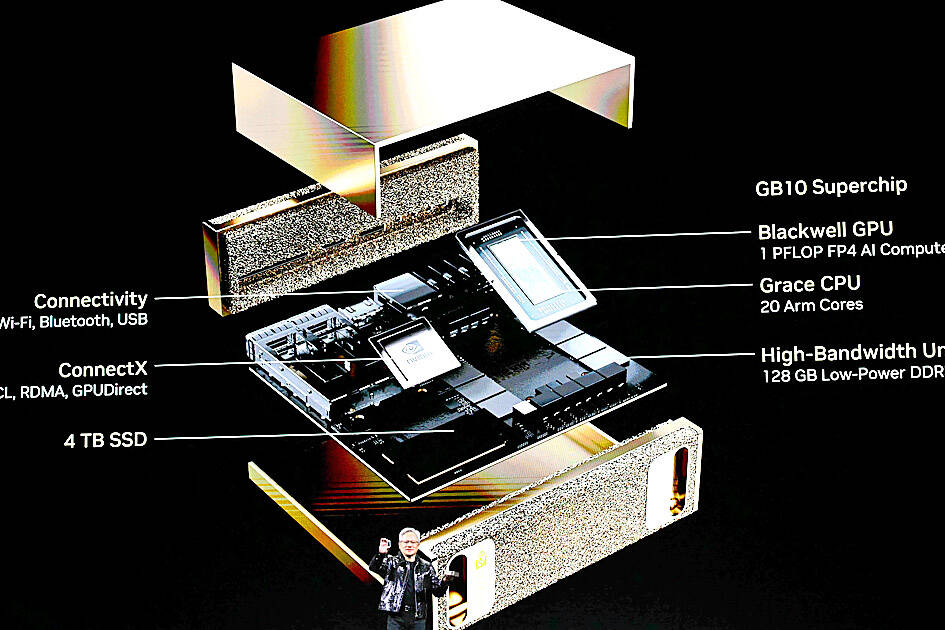MediaTek Inc (聯發科) yesterday said it is teaming up with Nvidia Corp to develop a new chip for artificial intelligence (AI) supercomputers that uses architecture licensed from Arm Holdings PLC.
The new product is targeting AI researchers, data scientists and students rather than the mass PC market, the company said.
The announcement comes as MediaTek makes efforts to add AI capabilities to its Dimensity chips for smartphones and tablets, Genio family for the Internet of Things devices, Pentonic series of smart TVs, Kompanio line of Arm-based Chromebooks, along with the Dimensity auto platform for vehicles.

Photo: AFP
MeidaTek, the world’s largest chip designer for smartphones and Arm-based Chromebooks, said in a statement that it is collaborating with Nvidia on the design of the GB10 Grace Blackwell superchip for Project Digits, a personal AI supercomputer.
“Our collaboration with Nvidia on the GB10 superchip aligns with MediaTek’s vision of helping make great technology accessible to anyone,” MediaTek vice chairman and chief executive officer Rick Tsai (蔡力行) said in the statement. “Along with Nvidia, we are working to usher in a new era of innovation and make AI ubiquitous.”
Nvidia said Project Digits is the world’s smallest AI supercomputer and is capable of running a 200 billion-parameter model.
“Project Digits, with the new GB10 superchip designed with MediaTek, makes our most powerful Grace Blackwell platform more accessible — placing it in the hands of developers, researchers and students to solve the most pressing issues of our time,” Nvidia chief executive officer Jensen Huang (黃仁勳) said in the statement.
Project Digits is scheduled to be available in May, starting at US$3,000, Nvidia said.
The new GB10 Grace Blackwell superchip targets a different market segment of ARM-based AI PCs from those equipped with Intel Corp’s Lunar Lake chip or Qualcomm Inc’s Snapdragon chips for average consumers and commercial PC users, an industry expert said.
The new chip is likely to be made using Taiwan Semiconductor Manufacturing Co’s (台積電) 3-nanometer process technology to compete with Intel’s Lunar Lake chip, which is also made on the Taiwanese company’s 3-nanometer technology, the expert said.

UNCERTAINTY: Innolux activated a stringent supply chain management mechanism, as it did during the COVID-19 pandemic, to ensure optimal inventory levels for customers Flat-panel display makers AUO Corp (友達) and Innolux Corp (群創) yesterday said that about 12 to 20 percent of their display business is at risk of potential US tariffs and that they would relocate production or shipment destinations to mitigate the levies’ effects. US tariffs would have a direct impact of US$200 million on AUO’s revenue, company chairman Paul Peng (彭雙浪) told reporters on the sidelines of the Touch Taiwan trade show in Taipei yesterday. That would make up about 12 percent of the company’s overall revenue. To cope with the tariff uncertainty, AUO plans to allocate its production to manufacturing facilities in

Taiwan will prioritize the development of silicon photonics by taking advantage of its strength in the semiconductor industry to build another shield to protect the local economy, National Development Council (NDC) Minister Paul Liu (劉鏡清) said yesterday. Speaking at a meeting of the legislature’s Economics Committee, Liu said Taiwan already has the artificial intelligence (AI) industry as a shield, after the semiconductor industry, to safeguard the country, and is looking at new unique fields to build more economic shields. While Taiwan will further strengthen its existing shields, over the longer term, the country is determined to focus on such potential segments as

COLLABORATION: Given Taiwan’s key position in global supply chains, the US firm is discussing strategies with local partners and clients to deal with global uncertainties Advanced Micro Devices Inc (AMD) yesterday said it is meeting with local ecosystem partners, including Taiwan Semiconductor Manufacturing Co (TSMC, 台積電), to discuss strategies, including long-term manufacturing, to navigate uncertainties such as US tariffs, as Taiwan occupies an important position in global supply chains. AMD chief executive officer Lisa Su (蘇姿丰) told reporters that Taiwan is an important part of the chip designer’s ecosystem and she is discussing with partners and customers in Taiwan to forge strong collaborations on different areas during this critical period. AMD has just become the first artificial-intelligence (AI) server chip customer of TSMC to utilize its advanced

While China’s leaders use their economic and political might to fight US President Donald Trump’s trade war “to the end,” its army of social media soldiers are embarking on a more humorous campaign online. Trump’s tariff blitz has seen Washington and Beijing impose eye-watering duties on imports from the other, fanning a standoff between the economic superpowers that has sparked global recession fears and sent markets into a tailspin. Trump says his policy is a response to years of being “ripped off” by other countries and aims to bring manufacturing to the US, forcing companies to employ US workers. However, China’s online warriors